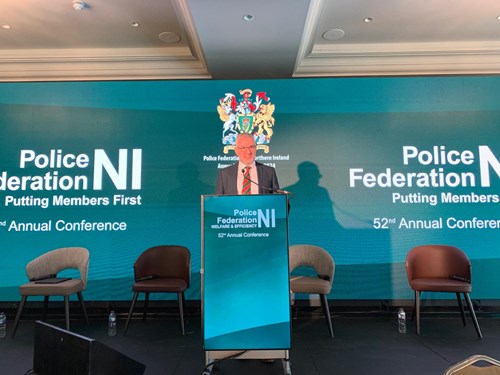PFNI Chair calls on Government and Executive to end ‘shameful, penny-pinching betrayal of policing

The Chair of the Police Federation for Northern Ireland, Liam Kelly, is calling on the Government and the Stormont Executive to end their ‘shameful, penny-pinching betrayal of policing’ and the officers who put themselves in harm’s way every day.
Speaking at the PFNI’s fifty-second annual conference, Mr Kelly told delegates that the PSNI was in the deepest resourcing crisis since its inception and warned that officer numbers would slide towards 6,000 unless there was urgent intervention.
In a wide-ranging keynote address, Mr Kelly highlighted assaults against officers, criticised the budget allocation to the PSNI, the undermining of services to the general public and the inordinate delays in dealing with complaint investigations.
Mr Kelly told Conference: “We will not stop until we convince the Government and the Executive to end their shameful, penny-pinching betrayal of policing in Northern Ireland and, more specifically, the men and women of the PSNI who puts themselves in harm’s way every day for the benefit of our society.
He warned of an £80 million deficit in the PSNI budget which would mean the organisation would again have to “drastically pare back services.”
Mr Kelly added: “There is an abject failure to properly fund and resource policing. We felt we earned the right to expect something better from our newly restored devolved institutions. That was misplaced confidence on our part.
“Not even having the ability to stand still is a recipe for disaster for the Service. Right now, we are in the deepest resourcing crisis since the formation of the PSNI in 2001.”
Later in his address, Mr Kelly set out how they would have to take the fight for a meaningful budget to London.
He said: “The drip-drip erosion has to end.
“Too few ‘folks on the hill’ have our back the way they really should.
“We want them to go to the next level….to say that we are being decimated numerically and that the money that’s allocated is insufficient.
“This is a battle that must be waged in Whitehall and Westminster. Collectively, the government’s more inclined to listen to Ministers from here – although there’s no guarantee they will - than they appear willing to listen to the Chief Constable or this Federation.”
“We have to stretch ourselves to be heard where it matters most. Convincing Treasury and No 10 that policing here is poorly resourced and supported by Departments will be Step One…
“We will put our members first, we will effectively advocate and fight the battles on their behalf.”
Mr Kelly said that the Service was 2,121 officers below the 8,500 required today. The total this month was 6,379 – a mere 21 ahead of what the Chief Constable said was his line in the sand for keeping people safe.
Mr Kelly continued: “At the rate of departures we are seeing right now, without urgent financial additionality we will slide towards 6,000 officers by either the end of this year or by the end of the current financial year.
“This will make our ability to respond effectively nigh on impossible and without positive intervention, the crisis in policing will continue to get worse.
“One officer per 320 of the population is wholly inadequate to meet the multiplicity of challenges that are out there. Great damage is being done and it is dangerous and irresponsible….
“We are being asked to do the impossible. Regrettably, it’s taking a heavy toll on our colleagues who are working flat-out in the most trying of circumstances.
“Our paymasters are sleep-walking into trouble.”
Turning to disciplinary matters, he told delegates that both the Police Ombudsman’s Office and the PSNI Professional Standards Department were taking inordinate lengths of time to complete investigations which had a detrimental impact on both the officers and the Service.
He said there was also worrying backlog of officers seeking professional psychological help and pointed to a chasm between rank-and-file and officers who lead the Service.
“There remains a fear culture that the discipline pathway is more likely, particularly for junior officers, than any tangible senior management support. We need our leadership to back officers, not break them.”
The PFNI Chair set out how there had been 3,346 assaults notified in 2022/23. Of that total, 979 involved injury to officers, an increase of 7.6% on the previous year. The injury total is up 55% on the 2018/19 figures.
Mr Kelly said: “Incredibly it is probably worse as there is still an element of under-reporting of assaults by colleagues. The statistics need to reflect the reality so we can shine a light on the true extent of this problem.”
He welcomed the commitment by the Justice Minister to prioritise new sentencing guidelines to deal with those who assault police and emergency service colleagues.
He continued: “We must have stronger penalties and meaningful custodial sentences to deter would-be attackers. They must be left in no doubt and made to think twice before carrying out assaults. We have to drive down these unacceptable assault figures.”
On police pay, Mr Kelly declared: “Let me be clear: any attempt to break with core pay spine parity with our England and Wales colleagues would be a retrograde step. I hope this isn’t an option being considered in future as it would only serve to further devalue the work our officers do, day and daily. I fear the repercussions if we become the worst paid policing service in what is the most dangerous part of the UK. Our officers, like all others in both the Public and Private Sectors, deserve at the very least to be treated fairly on pay.”



